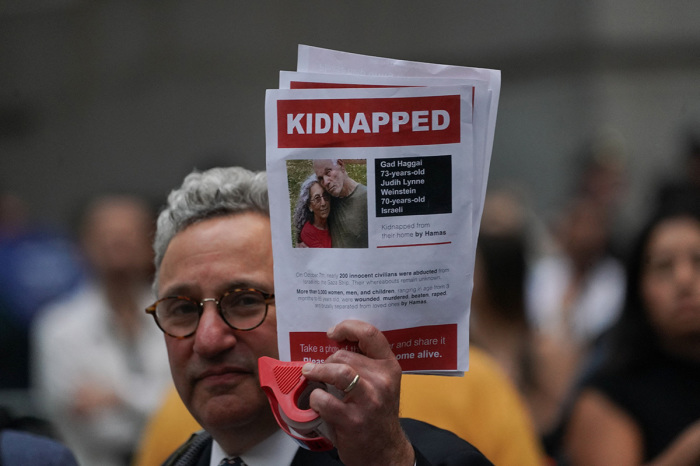Hamas holding up ceasefire by refusing to release vulnerable hostages: US official

The terrorist group Hamas is holding up negotiations for a six-week ceasefire deal by refusing to release a certain number of vulnerable hostages, including the elderly and the wounded, a senior Biden administration official claims.
The individual identified as "senior official number two" relayed this information to reporters during a background press call last week before President Joe Biden's State of the Union address.
The official highlighted the importance of addressing the needs of civilians in Gaza, stating that a temporary ceasefire is necessary amid the administration's efforts to assist with providing humanitarian aid.
"The path to a ceasefire is straightforward. There could be at least a six-week ceasefire today if Hamas would agree to release a defined category of vulnerable hostages, including women, elderly, sick, and the wounded," the official said. "That deal is on the table now and has been for more than the past week."
"It would bring immediate relief to the people of Gaza. It would also create the conditions needed to enable the urgent humanitarian work that must be done. The onus right now is on Hamas."
According to the official, the U.S. has provided over $180 million in humanitarian assistance to Gaza since Oct. 7, the day Hamas attacked civilians in southern Israel. The terror group slaughtered at least 1,200 people, a majority of them civilians, and it abducted around 240 others. As a result, Israel declared war with the goal of eradicating Hamas, which has controlled the Gaza Strip since 2007, and securing the release of the hostages.
The Hamas-run Gaza Health Ministry states that over 31,000 Palestinians have been killed since the war began in October. Those figures don't differentiate between combatants and survivors. Some commentators have expressed skepticism concerning the authenticity of figures provided by Hamas.
A senior U.S. official said the Biden administration is working to secure the deal before Ramadan, which began on Sunday. The plan is for the deal to occur in three phases, with the first consisting of a six-week ceasefire.
"And there are arrangements — as we had even during the ceasefire deal in November that led to 105 hostages coming out over seven days, repositioning of Israeli forces during that period, arrangements for movement — all of that stuff has been negotiated," the official said. "And even returning people to the north, that is something that has been worked on in some detail."
As the official noted, one of Hamas' leaders called for violence over Ramadan, and the Biden administration member expressed concerns that extremists may use the holy month to "spark something." Ramadan runs this year from March 10 to April 9.
The official clarified that "there's no hard and fast deadline on this negotiation."
The official stressed that a ceasefire is "first and foremost" on the administration's mind.
"But everything we're doing here, including with this new U.S.-led military mission, is important for setting the conditions throughout Gaza for people to ultimately return to their places of residence," the official added.
During his State of the Union speech Thursday night, the president announced a plan to construct a port to allow humanitarian aid into Gaza.
"I'm directing the U.S. military to lead an emergency mission to establish a temporary pier in the Mediterranean on the Gaza coast that can receive large ships carrying food, water, medicine and temporary shelters," Biden said in his address to Congress from the U.S. Capitol.
"No U.S. boots will be on the ground," he said. "This temporary pier would enable a massive increase in the amount of humanitarian assistance getting into Gaza every day. But Israel must also do its part."
Samantha Kamman is a reporter for The Christian Post. She can be reached at: samantha.kamman@christianpost.com. Follow her on Twitter: @Samantha_Kamman





























